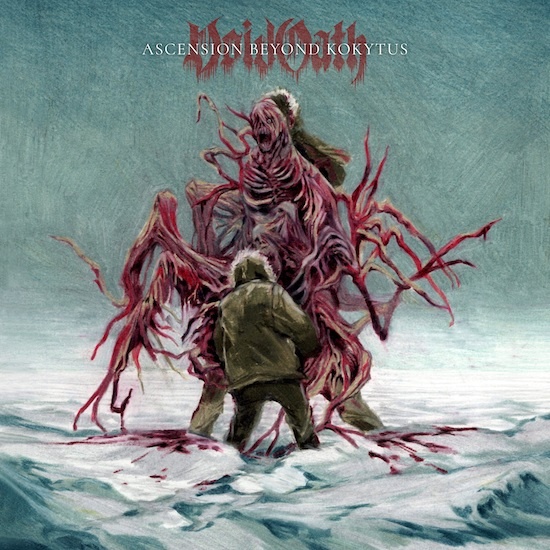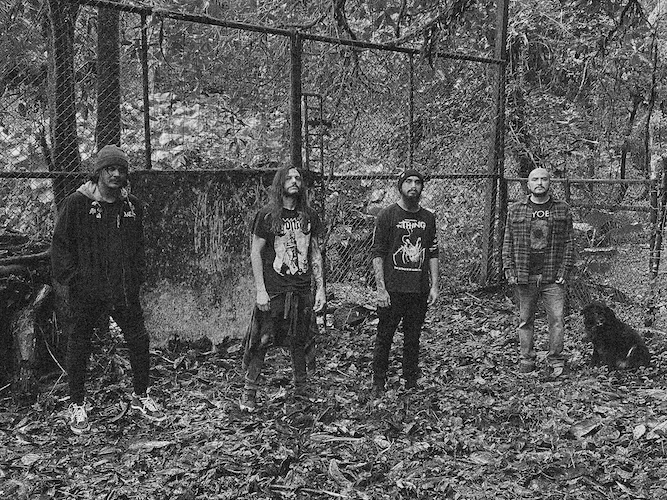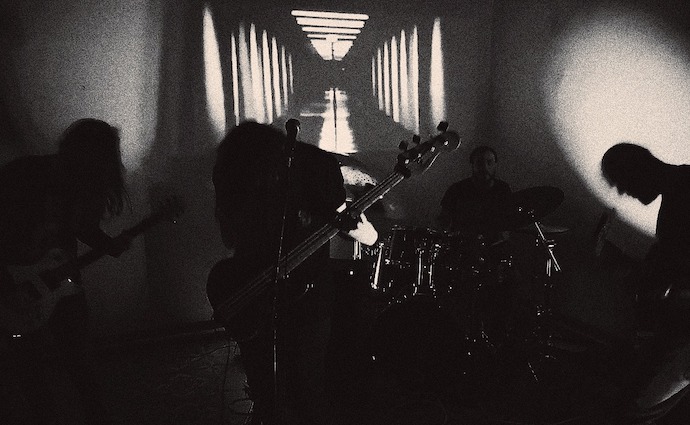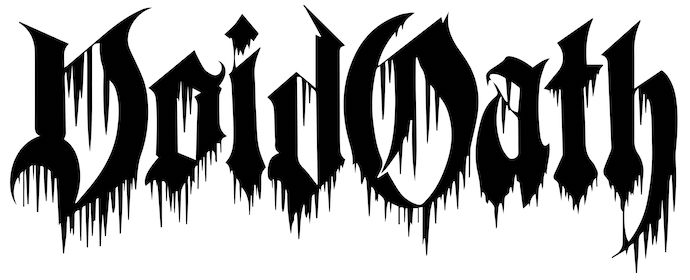
Some fans of extreme music are also fans of interesting album concepts and well-written lyrics, perhaps because such things are so few and far between in the great and continuing flood of new releases, like finding a scattering of diamonds in your sock drawer. Other fans could really care less about that, focusing instead on the music and the vocals (where the words are rarely decipherable anyway). But today we’re going to begin with concept and words, and perhaps you’ll soon understand why.
The inspiration for Ascension Beyond Kokytus, the debut album by the Costa Rican band VoidOath, was deeply rooted in the lore created by John W. Campbell Jr. through his 1938 science fiction novella Who goes there? and the novel-length version of that story, Frozen Hell, which was discovered and published after Campbell‘s death, as well as the 1982 film The Thing, John Carpenter’s classic adaptation/remake of the Campbell story.

As anyone knows who has seen The Thing (has anyone not seen it?) or read either Campbell‘s original novella or the novel-length version of it, it is a truly horrifying tale. The lyrics of the songs on VoidOath‘s album are also vividly horrifying, perhaps even more so because they are not a simple linear narrative, not so much a clearly defined plot as evocative visions of terror and vast devastation, parts of which seem to be the thoughts of the alien beast itself. The band summarize the experience this way:
“The four songs reflect four stages in the story, involving the arrival of the creature to the planet, how it infiltrates humanity, making them anxious, isolated and paranoid. To finally deliver a striking blow by taking over the entire planet, obliterating every single creature and cell on Earth. Nothing else left, but the Creature”.
In a variation from the original story, the final song does refer to the extinction of our world, as well as many other worlds, though all the lyrics could be interpreted in different ways, even for those who know the story that inspired them. One might even say they are a ghastly kind of poetry: They would mystify and chill the blood even if you had no idea about the works of Campbell and Carpenter. (The lyrics haven’t all been published yet, but you can read the ones for the opening track here.)
But let’s now discuss how VoidOath have rendered these portrayals in the four songs (plus one brief interlude) and roughly 50 minutes of the album as a whole.

Those of you who heard the band’s very impressive first record, the Illumination Through Necromancy EP released in 2020 (which we reviewed here), will have some idea. That rendering of sludge and doom, which showed a preference for long-form compositions, was both titanically heavy and frighteningly demented, both pulverizing and catastrophic.
Much the same could be said of Ascension Beyond Kokytus, though this time the band have more decisively brought in ingredients from black metal and post-metal.
The horrifying atmosphere of the music derives from several sources. One principal source is the vocals. The words may not all be decipherable, but the mix of abyssal growls, cauterizing shrieks, and wrenching cries is indeed chilling. Another source is the dissonant and discordant riffing, which blares and wails in ways that are both disturbing and disorienting, coupled with the screams and horrid mewling of the lead guitar.
The sensations generated by the fretwork and the judiciously employed synths are suitably alien and frequently hideous, and quite effective in morphing and mutating, much as the Creature itself does after ingesting its victims. The band also dive deep into doom (including funeral death-doom), in the most ponderous of the songs’ movements, spilling out misery in sounds of ichor congealing in sub-zero temperatures and the gloom of utter hopelessness.

The band also capture the scale of the confusion, derangement, and devastation portrayed in the album’s concept. In a word, the heaviness and obliterating impact of the music becomes immense. The bass sounds massive, the drums hit with megaton power. When the music stomps, you can imagine granite cracking, and when it drags it also sounds capable of gouging deep furrows through bedrock.
But VoidOath also get more aggressive than you might expect from the previous EP. It’s electrifying when percussive blasting and scalding chords erupt, and even in assaults that are less barbaric, the vigorous beating inflicted by the drums and the pile-driving riffage is startling in its savagery, and the tremolo’d frenzies, the drumming outbursts, and the maniac vocals channel insanity and violent upheaval in frightening fashion.
Perhaps needless to say, the songs, though extremely long, are also riveting in their dynamism. That’s how the band lead you through such long soundscapes, by switching up the tempos and the array of nightmare visions they spawn.
And so, to return to where we started, VoidOath have succeeded in creating music that’s a well-made match for their album’s terrifying concept and mind-mangling lyrics. It is deeply unsettling, but so well-made that it’s relentlessly immersive. See for yourselves through our premiere stream of the entire monstrosity:
VOIDOATH is:
Christopher De Haan – Guitars, Vocals
Gabriel Ortiz – Drums
Jose Rodríguez – Guitars, Synths
Allan Salas – Bass
Ascension Beyond Kokytus features cover art by Nataly Nikitina (lilcthulhu). It was recorded and produced by Jose Rodríguez at A Cabin in The Woods in San José, Costa Rica.
The album will be available on CD and Digital via Cursed Monk Records in the UK/EU, and via Cognitive Discordance Records in the US. The release date is September 30th, and it’s available for pre-order now.
PRE-ORDER:
EU/UK: https://cursedmonk.bandcamp.com/album/ascension-beyond-kokytus
US: https://cognitivediscordancerecords.bandcamp.com/album/ascension-beyond-kokytus
FOLLOW VOIDOATH:
https://www.facebook.com/voidoath

Had to take off my clothes for this one !
No encumbrances !
I suppose we should expect nothing less from someone who uses the name Rigorous Intercourse. Just be careful where you let the tentacles come in.